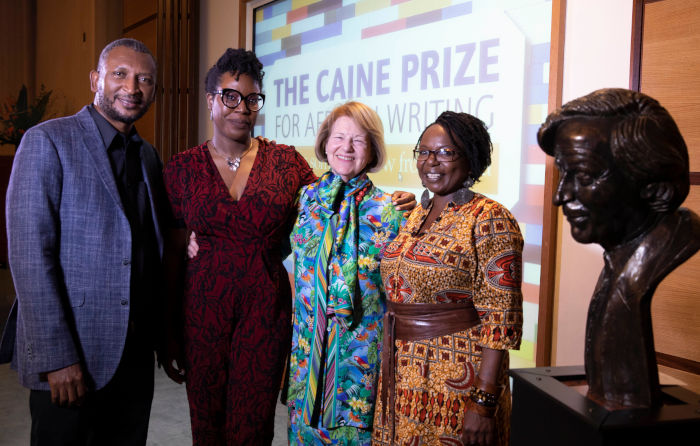Lesley Nneka Arimah has won the twentieth edition of the Caine Prize for African Writing for her short story ‘Skinned’.
The prize was launched in 2000, and is awarded annually to an African writer of a short story published in English. The winner receives £10,000 prize money, and each shortlisted writer also receives £500.
Arimah, whose debut collection of short stories What It Means When a Man Falls From the Sky was published in 2017, has been shortlisted for the prize twice before, in 2016 and 2017.

In her acceptance speech, Arimah emphasised that African writers should centre the African gaze.
To her fellow shortlisted writers, she said: ‘Your stories have added to the profile of African literature, adding the many voices that we need to illuminate who we are.’
She continued:
‘When I think of what literature can do, and I think of the ways that literature has changed minds and opened imaginations, I want to say that we African writers must centre the African gaze. We must centre the Nigerian gaze, the Cameroonian gaze, the Ethiopean gaze, the Kenyan gaze. We need to be writing to and for each other, and we also need to play.
‘And what I mean by play is that when one knows a thing inside and out, say cooking, for example, the chefs who can do fusion cooking can do so because they know both cuisines that they are using intimately.
‘I think of experimentation as a sign of expertise. And I think that it’s important that we continue as we have started, as we have been, as we are doing always, that we continue to play within the bounds of our literatures, between the bounds of our cultures, within the bounds of our worlds, that we challenge each other, we complicate our own narratives, we complicate our histories, we complicate the ways that we understand each other. And I emphasise “each other” because, yes, we must centre the African gaze. Thank you so much.’
From the prize:
‘Skinned’ envisions a society in which young girls are ceremonially ‘uncovered’ and must marry in order to regain the right to be clothed. It tells the story of Ejem, a young woman uncovered at the age of fifteen yet ‘unclaimed’ in adulthood, and her attempts to negotiate a rigidly stratified society following the breakdown of a protective friendship with the married Chidinma. With a wit, prescience, and a wicked imagination, ‘Skinned’ is a bold and unsettling tale of bodily autonomy and womanhood, and the fault lines along which solidarities are formed and broken.
Also on the shortlist this year were Meron Hadero (Ethiopia) for ‘The Wall’, Cherrie Kandie (Kenya) for ‘Sew My Mouth’, Ngwah-Mbo Nana Nkweti (Cameroon) for ‘It Takes A Village Some Say’, and Tochukwu Emmanuel Okafor (Nigeria) for ‘All Our Lives’.
The 2019 Caine Prize judging panel this year was Kenyan writer Peter Kimani (chair), Nigerian author and playwright Sefi Atta, who was shortlisted for the 2006 Caine Prize; acclaimed author and journalist Margie Orford; Professor Scott Taylor, director of the African Studies Program at Georgetown University; and Sierra Leone-born author Olufemi Terry, winner of the 2010 Caine Prize.
Announcing the award, Kimani said: ‘The winner of this year’s Caine Prize for African Writing is a unique retake of women’s struggle for inclusion in a society regulated by rituals. Lesley Nneka Arimah’s “Skinned” defamiliarises the familiar to topple social hierarchies, challenge traditions and envision new possibilities for women of the world.
‘Using a sprightly diction, she invents a dystopian universe inhabited by unforgettable characters where friendship is tested, innocence is lost, and readers gain a new understanding of life.’
The shortlisted stories will be printed by New Internationalist in a special publication to mark the twentieth anniversary of the Caine Prize, and through co-publishers in sixteen African countries, including Jacana Media in South Africa. This year the Caine Prize is also publishing a special anniversary anthology to mark the twentieth year of the award.
Last year’s prize was won by Kenyan writer Makena Onjerika, for her short story ‘Fanta Blackcurrant’.





